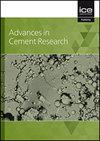Study on Early Hydration Behavior and Mechanical Properties of Basic Magnesium Sulfate Cement Using Electrodeless Resistivity Measurements
IF 1.3
4区 工程技术
Q3 CONSTRUCTION & BUILDING TECHNOLOGY
引用次数: 0
Abstract
The effect of early hydration behavior on the long-term performance of cement is profound, but its study is lacking. The early hydration behavior and mechanical properties of basic magnesium sulfate (BMS) cement were investigated by using electrodeless resistivity test combined with compressive strength measurement, XRD, SEM and Mercury intrusion porosimetry (MIP). As a result, the early hydration process of BMS cement can be clearly divided into three stages including induction period, acceleration period and deceleration period according to the resistivity variation curve. A linear correlation between the resistivity and setting time of BMS cement is established. Thus the initial setting time and final setting time of BMS cement can be estimated using feature point A (the time that the growth rate of resistivity starts rising) and feature point B (the time for the maximum growth rate of resistivity) on the differential curve of electrical resistivity, respectively. Moreover, a linear fitting equation between the resistivity (24 h) and compressive strength of BMS cement curing for 28 d is determined. The correlation coefficient is as high as 0.9979. Using the fitted linear equation, the long-term strength (28 d) of BMS cement can be precisely predicted by the measured resistivity (24 h). This study provides us a feasible, accurate and in situ method for understanding the early hydration behavior and quality monitoring of BMS cement.无电极电阻率法研究碱性硫酸镁水泥早期水化行为及力学性能
早期水化行为对水泥长期性能的影响是深远的,但缺乏研究。采用无电极电阻率试验,结合抗压强度测试、XRD、SEM和压汞孔隙率测试,研究了碱性硫酸镁(BMS)水泥的早期水化行为和力学性能。因此,根据电阻率变化曲线,BMS水泥的早期水化过程可以明确地分为诱导期、加速期和减速期三个阶段。建立了BMS水泥的电阻率与凝结时间之间的线性关系。因此,BMS水泥的初凝时间和终凝时间可以分别使用电阻率微分曲线上的特征点A(电阻率增长率开始上升的时间)和特征点B(电阻率最大增长率的时间)来估计。此外,还确定了BMS水泥养护28d的电阻率(24 h)与抗压强度之间的线性拟合方程。相关系数高达0.9979。使用拟合的线性方程,BMS水泥的长期强度(28d)可以通过测量的电阻率(24h)精确预测。本研究为我们了解BMS水泥的早期水化行为和质量监测提供了一种可行、准确、原位的方法。
本文章由计算机程序翻译,如有差异,请以英文原文为准。
求助全文
约1分钟内获得全文
求助全文
来源期刊

Advances in Cement Research
工程技术-材料科学:综合
CiteScore
3.70
自引率
5.00%
发文量
56
审稿时长
3.2 months
期刊介绍:
Advances in Cement Research highlights the scientific ideas and innovations within the cutting-edge cement manufacture industry. It is a global journal with a scope encompassing cement manufacture and materials, properties and durability of cementitious materials and systems, hydration, interaction of cement with other materials, analysis and testing, special cements and applications.
 求助内容:
求助内容: 应助结果提醒方式:
应助结果提醒方式:


